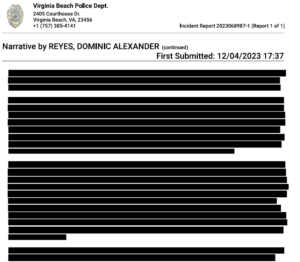For a short time after the passage of HB2004 in 2021, records of closed police investigations in Virginia were opened to public scrutiny. With the changes from that bill, the Virginia Freedom of Information Act made disclosure of criminal investigative files mandatory when the investigation was “not ongoing.” After the law took effect, the family of Kionte Spencer was able to obtain video of his fatal shooting at the hands of Roanoke County police officers—video that the department had refused to show his family since his death in February 2016.
That newfound transparency dimmed less than a year later, with the passage of HB734. In a swift reversal, legislators amended the law to give police departments and other law enforcement agencies complete discretion to decide whether or not to release records of closed investigations. Legislators who voted for the bill evidently believed the change was necessary to protect victims and their families from the release of sensitive photos of their loved ones. “We do want to protect victims as much as we can. We don’t want those pictures out on the internet,” Sen. Richard Stuart said during a committee hearing on the bill. In fact, the 2021 law already prohibited release of such photographs.
But how is this change working out in practice? When police departments use their rediscovered discretion to deny a request for records, are they doing it to protect the families of victims?
On February 12, 2024, Virginia Beach police officers arrested James Humphrey at GBRS Group, his place of employment. They accused him of stealing a firearm from his employer, a firearms dealer that employed him, and of possessing a controlled substance. But shortly after Humphrey was arrested, those accusations were abandoned. Why? For one thing, it turned out that the firearm was never stolen in the first place.
“So ten minutes after you guys left, this showed up,” an employee told officers after the arrest, according to bodycam video of the incident. “This” was the purportedly stolen firearm.
How did Virginia Beach police officers come to arrest somebody for a theft that never took place? Did the firearm ever actually leave the building? What kind of investigation did the officers conduct before making the arrest? That part isn’t clear. The lead officer, Dominic Reyes, appears to have a personal relationship with the accusers. “I’mma walk back in there and say hi to my boy real quick,” he says at one point in the video, apparently referring to an employee of GBRS Group. For his part, Humphrey takes issue with how Reyes “assured my employer that he would ‘document the heck out of the report’ to absolve them of any potential repercussions, further exacerbating the injustice I have faced.”
I wanted to learn more, so I sent a FOIA request to the Virginia Beach Police Department asking for their written reports concerning the incident. The department’s FOIA Specialist, Maria Ray, refused.
“Virginia Code § 2.2-3706.1(D) provides that criminal investigative files relating to a criminal investigation or proceeding that is not ongoing are excluded from the mandatory disclosure provisions of the Virginia Freedom of Information Act,” she wrote in response to my request. “The cited Code section does provide for victim access to records of criminal investigations that are no longer ongoing, but that right of access does not extend to you as you are not listed on the report. Therefore, the 8-pg internal copy of the police report is being withheld as criminal investigative information/material.”
After I persisted (and threatened to sue over the violation of Virginia Code §2.2-3706.1(B)) I was eventually given a copy of the written reports. Nearly everything is redacted. Only two sentences of the narrative give any insight into what happened:
“I arrested Humphries [sic] for Larceny of a Firearm and for Possession of a Schedule 1 Substance While Carrying a Firearm”, Officer Reyes wrote.
Then, a couple of paragraphs later, “With no charges to proceed on, I un-arrested Humphries [sic].”
Ray justified the deletions by pointing to the changes introduced by HB734. “[P]ursuant to Virginia Code § 2.2-3706.1(D) information that is criminal investigative material has been redacted from the report as it is a not ongoing criminal investigation or proceeding and excluded from the mandatory disclosure provisions of the Virginia Freedom of Information Act,” she wrote.
In other words, “We’re allowed to keep this from you, therefore we’re going to keep it from you. Buzz off.”
Nothing about this decision protects victims or their families. There were no victims. There wasn’t even any crime! There are serious concerns here about officers’ investigative methods and their potential bias. But the public won’t get answers because the Virginia Beach Police Department finds the questions inconvenient and the answers potentially embarrassing. They’ve taken a mechanism that was justified as a shield for crime victims and are using it to shield themselves from public scrutiny. The cynic in me suspects that was the actual intent of HB734 all along. But if that wasn’t the case, legislators need to pick this issue up again and give us a statute that demands real transparency and accountability from our law enforcement.

Leave a Reply